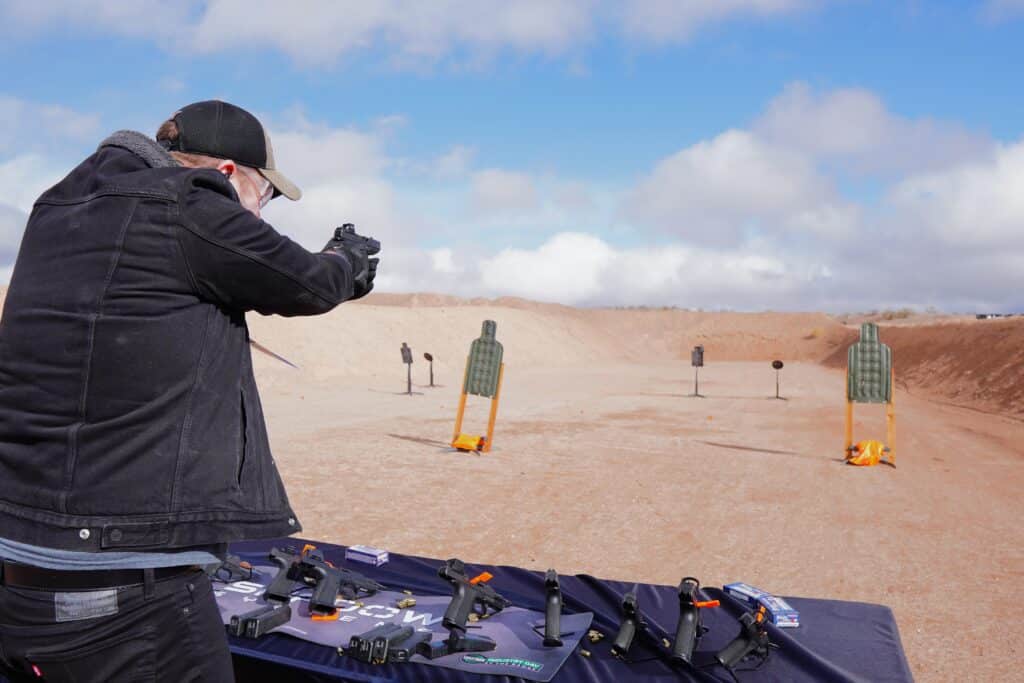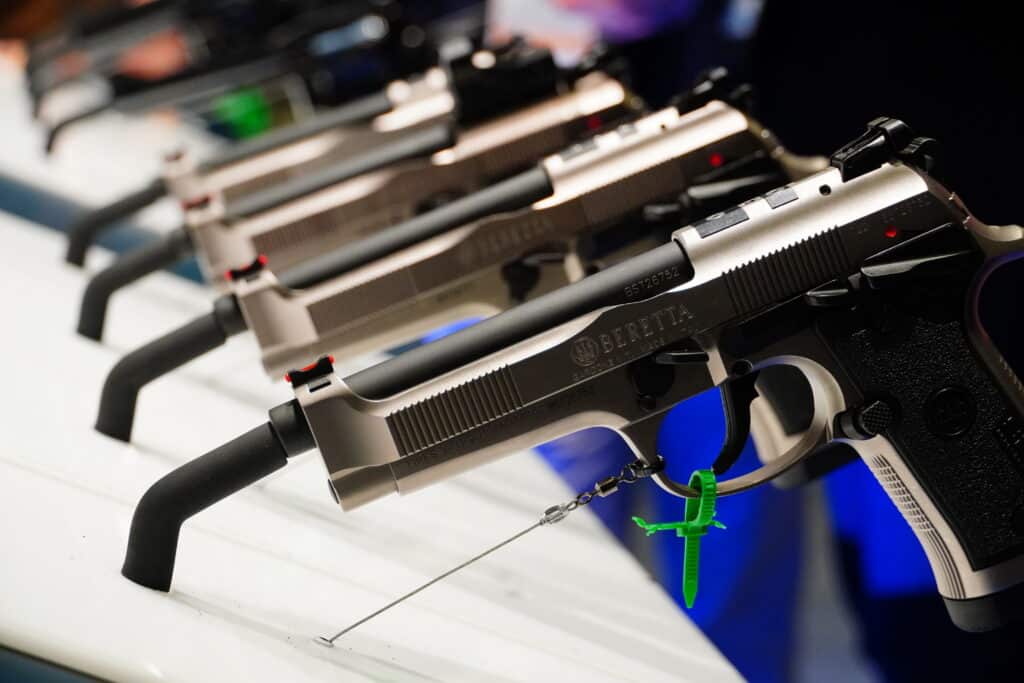Because the yr winds down, Congress has one final shock for gun house owners—and it’s one they’ll like.
In one of many yr’s last payments, Congress licensed the event of recent taking pictures ranges on federal land. The invoice pushed for at the very least one vary in each Nationwide Forest and Bureau of Land Administration district. And it did so with no pushback.
I clarify why I believe that claims extra concerning the state of assist for leisure taking pictures than any ballot may.
Contributing Author Jake Fogleman additionally takes a take a look at the latest ruling on non-violent felon gun rights. He lays out why two federal judges seemed on the Supreme Court docket’s Rahimi choice and flipped over to the facet of a Pennsylvania man whose gun rights had been stripped after mendacity to get meals stamps within the 90s.
No podcast this week as we take a brief break for the vacations. We’ll be again to our recurrently scheduled program quickly, although.
Within the meantime, we’d like to have extra of you guys on the present for Members Segments, and we’d wish to know who you’d like to listen to on the podcast subsequent, too. Simply go away your solutions within the feedback, and we’ll have a look!

Evaluation: Leisure Taking pictures Stays Common Throughout Occasion Traces [Member Exclusive]By Stephen Gutowski
As 2024 drew to an in depth, one of many final issues Congress did was increase alternatives for Individuals to follow taking pictures on federal lands. It did so with broad bipartisan assist and with none noticeable opposition.
It was so uncontroversial that it acquired virtually zero information protection past The Reload.
Now, Congress included the vary entry invoice as half of a bigger piece of laws that includes a number of uncontroversial reforms to federal land administration. It additionally doesn’t deal with any of the gun-rights motion’s high priorities and simply focuses on the extra modest objective of vary growth. However the invoice’s overwhelmingly bipartisan nature and breezy path via Congress present a extra concrete instance of simply how in style leisure taking pictures is in america than any opinion ballot may present.
In any case, the Discover Act truly had extra Democratic co-sponsors within the Home than Republican ones–although it was practically even. It handed that physique of Congress by voice vote, which suggests there weren’t any recorded no votes. The identical was true within the Senate, the place it sailed via on unanimous consent.
All of that occurred at a time when polarization has reached a brand new zenith. On the identical time Congress was narrowly avoiding a authorities shutdown on the final second, and one other Home Speaker struggle, the Discover Act made it to President Joe Biden’s desk with out bother. If anybody instructed you one of many final issues the outgoing Congress would do in 2024 was go a gun invoice, you most likely wouldn’t have believed them. However that’s what it simply did.
Biden hasn’t formally introduced what he’ll do with it, however all indicators level to him signing it. He didn’t publicly oppose it in spite of everything. No person actually did.
That’s fairly fascinating since it is going to increase the variety of taking pictures ranges on federal land. And people ranges should accommodate each pistol and rifle taking pictures. And it’ll all be funded by the federal authorities from pre-existing income sources.
However, as with handgun possession writ massive, that is an space the place we see broad settlement in America. Leisure taking pictures and looking are in style. Serving to individuals safely follow taking pictures is uncontroversial.
On condition that a lot of the dialog round weapons facilities on areas of broad disagreement, it’s important to note the alternative. It doesn’t result in a lot drama and, subsequently, doesn’t draw many headlines. However there are gun proposals that stay in style sufficient to get via Congress with no struggle or perhaps a fuss.
That won’t assist gun-rights activists of their quest to make nationwide reciprocity or silencer deregulation the regulation of the land. Nor will it assist gun-control activists re-institute the federal “assault weapons” ban.
Nevertheless, it gives a place to begin for what sort of laws would possibly make it via the following Congress, which is shaping as much as be as deeply divided on gun coverage as the present one.

Evaluation: How Rahimi Made Two Judges Swap Sides on Non-Violent Felon Gun Rights [Member Exclusive]By Jake Fogleman
The Supreme Court docket’s most up-to-date Second Modification choice may enhance the federal government’s means to disarm sure Individuals in the long term. However it seems to have pushed two federal appeals court docket judges to the alternative conclusion in a brand new ruling on a non-violent felon’s gun rights.
On Monday, the en banc Third Circuit Court docket of Appeals returned the primary choice to facet with a Second Modification challenger in a case the Supreme Court docket vacated and remanded after its Rahimi opinion. For the second time, it dominated that the federal government might not disarm Bryan Vary over his 30-year-old felony conviction for mendacity on a meals stamp utility.
“We agree with Vary that, regardless of his false assertion conviction, he stays amongst ‘the individuals’ protected by the Second Modification,” Choose Thomas Hardiman wrote in Vary v. Garland. “And since the Authorities didn’t carry its burden of exhibiting that the rules underlying our Nation’s historical past and custom of firearm regulation assist disarming Vary, we are going to reverse and remand.”
Whereas the unchanged judgment was largely anticipated primarily based on the tenor of the case’s second oral arguments, one aspect of Monday’s end result stood out. Two judges who dissented the primary time the Third Circuit heard the case—Cheryl Ann Krause and Jane Roth—signed onto the bulk judgment this time round, increasing the margin of the authorities’s defeat. Furthermore, they cited the Supreme Court docket’s Rahimi opinion as driving that change of coronary heart.
“I take from Rahimi a number of classes that compel a unique rationale than the bulk’s right now and that lead me now to concur within the judgment,” Choose Krause wrote in her concurring opinion, which Choose Roth joined.
That Rahimi would immediate a number of judges to rule in opposition to the federal government’s want to disarm somebody may shock some observers. In any case, Rahimi was an 8-1 Supreme Court docket ruling in favor of the federal government’s energy to disarm these topic to home violence restraining orders. Justice Clarence Thomas, the writer of the Bruen check, was additionally the lone dissenter in Rahimi. In his scathing dissent, he primarily charged the bulk’s reasoning with already undermining its nascent Second Modification check and granting broad latitude to the federal government’s energy to disarm.
“On condition that imprisonment (which concerned disarmament) existed on the founding, the Authorities can all the time fulfill this newly minted comparable-burden requirement,” Thomas wrote. “Meaning the Authorities want solely discover a historic regulation with a comparable justification to validate fashionable disarmament regimes. In consequence, historic legal guidelines fining sure conduct may justify utterly disarming an individual for a similar conduct. That’s the precise form of ‘regulatory clean verify’ that Bruen warns in opposition to and the American individuals ratified the Second Modification to preclude.”
But in accordance with Choose Krause, the “regulatory clean verify” Thomas forewarned about truly redounded to the good thing about a non-violent felon seeking to get his gun rights again.
“Though § 922(g)(1) on its face matches ‘neatly inside’ our historic custom, there’s one respect through which the regime it establishes—in follow—doesn’t comport with the ‘how’ of those relevantly related historic rules,” she wrote. “As I learn Rahimi, that qualification obligates us to think about and in the end grant Vary’s request for declaratory aid.”
Particularly, she famous that the historical past and custom of “categorical disarmament legal guidelines,” which allowed Founding-era governments to disclaim arms to sure teams presumed to pose a danger to society, additionally contained methods for people to contest that disarmament.
“There was usually a mechanism for him to petition and try to rebut that presumption—whether or not by taking a loyalty oath, renouncing allegiance, acquiring a license, or securing a court docket order,” Krause wrote. “Even for offenses traditionally punishable by dying or lifetime imprisonment, and therefore, encompassing everlasting disarmament, that punishment adopted individualized determinations made by a choose and jury, and a convicted felon may additionally search clemency or a pardon primarily based on his particular person circumstances.”
She argued the presence of these rebuttal mechanisms inside the nation’s regulatory custom matched with “Rahimi’s consideration to the individualized findings required by and the durational restrict” of the actual home violence restraining order gun ban the Supreme Court docket blessed in that case. Taken collectively, she stated these two reality patterns level to a constitutional precept “the place disarmament is predicated on a categorical presumption of particular hazard to society, there have to be a significant alternative for individualized evaluate to outlive constitutional scrutiny.”
Whereas she disagreed with the bulk’s view that the burden must be on the federal government to show that somebody like Vary remains to be too harmful to own gun rights as a substitute of the opposite approach round, she argued that Vary’s many years of law-abiding conduct since his one, non-violent felony-equivalent offense rendered his “individualized evaluate” a straightforward name.
“In the end, nonetheless, the bulk and I land in the identical place as a result of I conclude that Vary has carried that burden,” Krause concluded.
To make sure, Rahimi’s affect on Krause’s pondering isn’t prone to completely reassure gun-rights advocates nonetheless cautious of the Supreme Court docket choice’s ramifications. Past the specifics of Vary’s problem, Krause made it a degree to emphasise how she reads Rahimi as endorsing looser analogizing in Second Modification instances extra typically.
One among its classes confirming “the premises of [her] prior opinion,” she wrote, is that “we should always certainly decide ‘whether or not the challenged regulation is in keeping with the rules that underpin our regulatory custom’—not whether or not it ‘exactly match[es] its historic precursors.’”
The emphasis on looser, principles-based analogies for contemporary gun legal guidelines will increase the likelihood of judges upholding restrictions slightly than a extra exacting method to historic legal guidelines. Nonetheless, the baseline for the 2 judges below simply Bruen was a ruling in opposition to non-violent felons having a path to Second Modification rights. Rahimi’s assist in shifting them away from that’s not insignificant.
That’s it for now.
I’ll discuss to you all once more quickly.
Thanks,Stephen GutowskiFounderThe Reload


![Analysis: How the Trump Administration Plans to Defend the Gun Ban for Weed Users at SCOTUS [Member Exclusive]](https://i2.wp.com/cdn.thereload.com/app/uploads/2025/07/IMG_5838-scaled.jpeg?w=350&resize=350,250&ssl=1)
![Podcast: What’s Going on With Virginia’s Gun Laws? (Ft. VCDL’s Philip Van Cleave) [Member Early Access]](https://i3.wp.com/cdn.thereload.com/app/uploads/2021/07/The-Podcast-Logo.png?w=350&resize=350,250&ssl=1)



![Epstein, Guns, and Sex Crimes: A Timeline [Member Exclusive]](https://i0.wp.com/cdn.thereload.com/app/uploads/2026/02/Jeffrey-Epstein-picture.png?w=350&resize=350,250&ssl=1)
![Analysis: Recreational Shooting Remains Popular Across Party Lines [Member Exclusive]](https://i1.wp.com/cdn.thereload.com/app/uploads/2023/01/DSC04537-scaled.jpg?w=75&resize=75,75&ssl=1)












